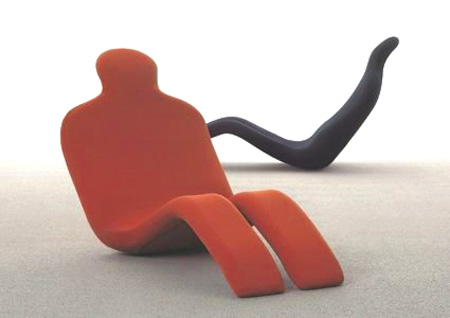
I didn't watch the Republican convention. I'm not a fan of political theater. But when my interwebs lit up with questions about Clint Eastwood, I watched the video of his appearance there. I am a fan of the bizarre.
In case you have not heard, Eastwood made what is being called an unscripted appearance before the convention in which he addressed an empty chair as if President Obama were sitting in it.
 And he reacted as if President Obama were speaking to him from the empty chair.
And he reacted as if President Obama were speaking to him from the empty chair.I confess, I didn't watch the whole video. I found the aggressive energy disturbing. I quit shortly after Eastwood acted as if the chair had told Romney to fuck himself. (At one point, he interrupted his "conversation" with "Mr. Obama" and asked, "what do you want me to tell Romney? I can't tell him to do that. I can't tell him to do that to himself."
Full transcript of Eastwood's remarks
Eastwood spoke Thursday night. By Friday morning, the critiques were rolling in.
And while I find it interesting and find my response to it of personal interest, I don't know that a whole lot of critique is necessary. Whaddya expect from Dirty Harry? High-minded political discourse? It reminded me of a moment in "The Commitments" where the elderly father starts thinking that his poop is talking to him. In the book it was a sign of his advancing dementia.
Unfortunately, a lot of us have chairs that talk to us, but our chairs are internal. They provide a spot for the inner critic, the voices of correction, the wounded children, the committee of judges whose refrains play over and over in our heads. The beings in the chairs tell us we're not good, we're not smart enough, we're not XX enough. That's where Mara sits -- or where the temptations and doubt that Mara sends to make us question our buddhahood park their asses while they hurl insults.
 One of the things we do through Buddhist meditation and study is to question who -- or what -- is in the chair. Our internal usher asks to see their tickets, only to find out that they booked the seats for a show in 1994 but have continued to attempt to undermine our confidence by bringing up how the one we loved didn't love us back. Or in the right way. Or in the way we thought we needed because we were still thinking about a show from 1991.
One of the things we do through Buddhist meditation and study is to question who -- or what -- is in the chair. Our internal usher asks to see their tickets, only to find out that they booked the seats for a show in 1994 but have continued to attempt to undermine our confidence by bringing up how the one we loved didn't love us back. Or in the right way. Or in the way we thought we needed because we were still thinking about a show from 1991.Through meditation, our internal usher gets stronger and wiser. We see the thoughts or memories that sit in our chairs and talk nasty to us. We question their presence. And finally we say, "I think you need to leave. You served a purpose at one time, but that time is gone. I'm not that person anymore and what you say is not helpful to the person I am becoming. Your ticket has expired." And you escort them out. Maybe they sneak back, but now you recognize them and move them out more quickly.
Watching Eastwood I thought about how much our perception of how a person is speaking to us is colored by what we expect to hear, how much we project the speaker's emotion onto the person who's speaking.
I know Eastwood is an actor. I understand that this was political theater. But I think it was illustrative of human interaction.
What do the empty chairs in your mind say to you? Is it as hostile and strange as what Eastwood's empty chair said to him?

(Photo of Eastwood: by Mark Wilson/Getty Images)
Chairs at Toxel.com
Bottom photo: Barack Obama's Facebook page Friday.





